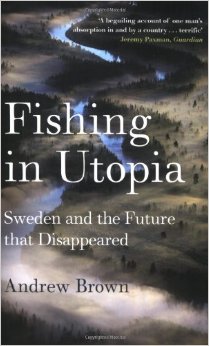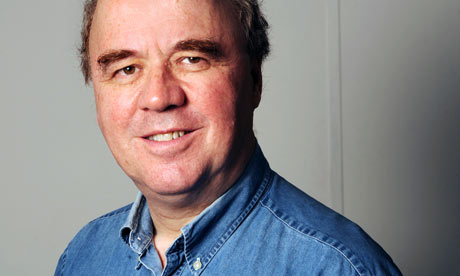This book came to mind when I read Michael Booth’s ‘The Almost Nearly Perfect People’ (2014) survey of Northern Europe. Booth mentions Brown’s book, too, in a rather left-handed way. Relying on my cataloguing system, I found this book on the shelf at the Ack-Comedy and had a look.

As when I read it first in 2009, I find it to be an understated book that neither condemns nor praises Sweden, the Swedish way, the Swedish model, and, accordingly, it does not satisfy the ideologues. It is low key in every way. It is more a personal memoir than an assessment of Sweden.
Brown lived in Sweden as a boy with diplomat parents, and later as a married man, and worked for a living in a sawmill. His experience of Sweden is far different from a travel writer who passes through for a few weeks of interviews in hotels and restaurants, and guided tours of the country side. His voice is muted and his comments are largely derived from direct, personal experience. Little is black or white, little is so clearcut to satisfy an ideologue. More importantly, his perspective is working class and from the hinterland, not urban middle class.
To judge from krimis Sweden is worse than Midsomer, every street, every town is replete with pedophiles, Neo-Nazis, Sven the Rippers, people smugglers, drug barons that put Latin Americans to shame, bankers who gave the Lehman Brothers lessons, and corporate villains to dwarf Enron, and worse. Anyone with a new car, a bank account in the black, a country cottage, a fine coat, got it by foul means. This compound of envy of the rich and imputation of evil to others is to be found in some other Nordic krimis, too, e.g., the Dane Jussi Adler-Olsen becomes poetic in his lyrical hatred of those he regards as rich. There is no depravity of which they are incapable. I fully expected to find his villains eating their own children, so I stopped reading his diatribes in malice.
But to return to Sweden, of course the pathfinders in this social criticism were Maj Sjöwall and Per Wahlöö. By the tenth volume in their Martin Beck series, the villains were cannibals. The first books in the series were police procedurals but along the way the authors ascended a soapbox and every page contained some sort of denunciation, not just of the evil rich, but the Swedish society that bore them. They attacked not just the filthy rich but the Social Democratic scrum who ran the place strictly for the benefit of the rich.
Talk about parochial! The authors lived in a decent society that had gone from subsistence farming to industrial surplus in the three generations, and they hated it for what it was not, namely, a communist Eden. It is rather like those self-righteous leftists in the 1960s who denounced Western liberalism as evil incarnate, while lining up to shake hands with Pol Pot. They do not know evil, that is for sure. Wake up! Look around. Try a few weeks in the third world. These very same types would spent hours defending Robert Mugabe, Muammar Gaddafi, or Fidel Castro, while condemning parliamentary democracy as a sham.
In contrast, Brown offers an everyday account of life and work. struggling to learn Swedish on the job in the mill. He finds much different from the England he left. As he notes many times, in Sweden there was a palpable sense of unity among the people he worked with which was aimed at getting things done. Ergo, the work in the factory was hard and everyone went at it with determination, including the owner. He contrasted this with his experience of working in a factory in England where the union made sure productivity was just enough to keep the wheels turning and no more. In Sweden everyone, including the union, wanted to get as much done as possible, whereas in England everyone, led by the union, want to do the least.
The unforgiving climate, the brutal history of the region with Germany on one side and Russia the other, and the recent past of grinding rural poverty combined, he speculated, to teach Swedes that the world does not owe them a living. They will have to earn it day by day. Brown met variations on this attitude in different guises, including church attendance. He found that religion, not necessary denoted by church attendance, seemed important to Swedes in the countryside where he lived. It was a sign of the larger whole beyond the individual.
That sense of a larger whole was comforting at times but stifling at others when he encountered a herd mentality such that no one dared to be different. Individual self-expression was actively disvalued in this milieu.
He is an outsider and is constantly aware of that and as constantly reminded of it by others. Swedes do not worry about what it means to be Swedish because they know it in their blood. They do not talk about it, they just live it. Brown wonders how this silent unity will wear with increasing immigration, made necessary by declining birthrates. The expectation to conform in Sweden is much greater than in England but there are almost no explicit clues about how to do it; he depended on his wife to cue his behaviour, say when checking out books at the library, cashing a cheque at a bank, buying groceries, all those everyday transactions that we do on automatic pilot he re-learned to do the Swedish way. For details read the book. He did learn to speak Swedish, by the way.
For the literal minded, yes there is quite a lot about fishing the book. It is Brown’s hobby and some of the most lyrical passages in the book are his weekends tramping through forests to lakes, amid man-eating mosquitos, to find a place to fish at sunrise, observing the breeze in the trees, the light on the water, the insects in the air. His father taught him to fish and he teaches his son.
The Sweden that Brown describes is all rather normal. Some people grizzle about taxes while cashing their pension cheques, denounce overpaid sportsmen while cheering them on. It is neither the paradise of its many rhapsodic admirers elsewhere, nor the putrid cesspit of depravity portrayed all too seriously by some krimi writers. It is no Midsomer!
 Andrew Brown
Andrew Brown
He returned to Sweden as a journalist and covered some of the aftermath of the murder of Olof Palmé in February 1986. There is superb thriller that springs from that event, ‘The Death of Pilgrim’ (2013). Of course, the conspiracy at the heart of the plot is simpleminded, but the performances and tension are very well done without the gratuituous gore and violence of some Nordic thrillers on screen, like ‘The Bridge.’ However, I found the time shifts back and forth threw me more than once, the clothing and hair styles were not enough to indicate to me the context. Brown, to his credit, does not compare Palmé’s murder to that of Jack, but the aftermaths are certainly similar, the desire for meaning, and the desperate desire for there to have been a conspiracy to give the act meaning.
Skip to content
